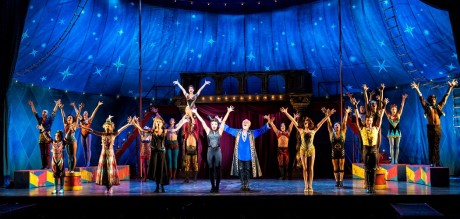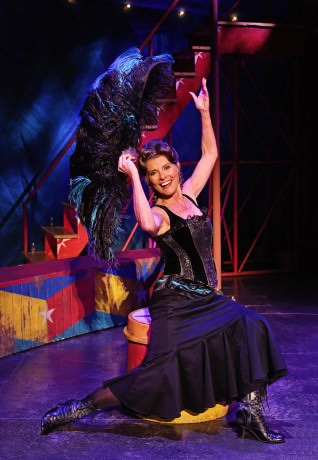When walking into the house of Philadelphia’s historic Academy of Music for Pippin, what could, at first, be the theatre’s fire curtain, or possibly the outer edge of a circus tent conceals the stage. From below, the sporadic outbursts of drums or chimes may be heard as the orchestra warms up. The combination lends itself to an air of excitement and mystery reminiscent of a child’s first trip to the big top itself—and this was only the beginning. As the curtain rises and the circus is revealed, the intrigue only increases, seamlessly weaving itself through the entirety of the production. The result is a fusion of spectacle, magic and theatricality which continues to shock at every turn.

Pippin was originally inspired by a paragraph in a textbook about the historical Pippin, the son who would overthrow his father—8th century Holy Roman Emperor—Charlemagne. Composer and lyricist, Stephen Schwartz took this idea and ran with it. The history is still there, but now told by a group of traveling performers. Even more, the story now focuses more on Pippin’s search for fulfillment in life than any textbook ever could.
The musical hit Broadway in 1972, directed and choreographed by Bob Fosse. In 2013, the musical saw a big return to New York when the new, circus-inspired revival was met with much acclaim, not to mention, a few Tonys. The mix of circus arts, acrobatics, theatrical magic and Fosse-inspired moves bring out all the best this tale has to offer—and the production presented by Broadway Philadelphia at the Academy of Music holds nothing back.
In the first moment, the silhouette of the Leading Player, played by Gabrielle McClinton, is revealed sauntering and posing behind the circus tent. The dark outline immediately throws focus on the body in the sexy, empowering, daring way only Fosse can. The body remains a focal point of the night. The extremes, the heights and the miraculous feats the human body is capable of continue to turn heads throughout the night. McClinton is a prime example of this. As our primary storyteller, the charisma and power with which she moved, sang and danced demanded attention. Whenever she was onstage, eyes flew to her—and this is no small deed since, at any given time, the stage may be swarmed with trapeze artists 20 feet in the air, acrobats flipping through hoops or knives being juggled between performers.
Yet, McClinton was not alone. The show, of course, has it’s standouts—the Emperor Charles, played by the original 1972 Pippin, John Rubinstein, and Pippin’s Grandmother Berthe, veteran actress Adrienne Barbeau, among them. However, it is obvious the ensemble makes the production. A varied group of trained acrobats and circus artists make up the troupe, and deliver one eye-popping move after another.

From the first moment the circus comes into full view in “Magic to Do,” the audience is mesmerized. While one performer walks down a flight of stairs on his hands, another tumbles through the air; the next moment, someone is dangling by their feet from the trapeze and someone else is balancing on their partner’s head. It is enough to make one feel like a child again. Those are the types of ensemble-driven moments Director Diane Paulus seamlessly wove into the story telling. The players are particularly astounding in “With You,” “Extraordinary” and “Glory,” which narrates a mediaeval bloodbath in a sultry way you have to see to believe.
Still, the players were not the only scene stealers of the night. Scott Pask’s scenic design cannot be ignored. The big top design lends itself to terrific transformation just as much as the malleable bodies of the acrobats. There is a simplicity in design allow the tent to become the night sky, a royal palace or an ancient cathedral with that sort of theatre magic which never ceases to amaze.
Feat after feat fill the the show. Yet, for all the spectacle and flash the production offers, Pippin’s struggle is at the heart of it all. The title character, played with wide-eyed wonder by Brian Flores, is young man searching for a way of life to match just how extraordinary he feels. This leads him to war, sex, revolution, politics and more. It is this internal longing to find fulfillment in life, framed in theatrical magic, which drives the show. Paulus crafts these themes masterfully. Flores, who runs the risk of falling prey to some of the more trite moments of the seventies pop-musical, combats this danger with an inevitably appealing earnestness which draws us in, again and again. Somehow the extravagant world of the circus world never seems too far off from our own because the questions plaguing Pippin fall to all of us at some time or another—what can I do to make me feel whole?
The second act undoubtedly feels less substantive than the first. It veers away from the 8th century and, eventually becomes a bit more of a metaphysical Faust tale than a page from a history textbook. However, the introduction of Catherine—normally played by Bradley Benjamin, but performed by understudy Laura Hall on opening—introduced a new, welcome tone. At first, her performance strikes an odd note. She sounds wonderful and is quite funny but something does not seem to fit in. However, it quickly becomes apparent what is so different about Hall’s Catherine. Against the backdrop of such magic and spectacle, and compared to such larger than life characters, Hall’s performance exudes humanity in all its awkward, funny, and confusing wonder. This is evident in the boisterous “Kind of Woman” and in a more somber tone in the touchingly contradictory “I Guess I’ll Miss the Man.” This quickly makes her one of the most grounded and sympathetic characters in the production.
The fanciful elements of Pippin all come together to elevate and transcend a basic human need inside us all. It is here that the jocular whimsy of the circus walks a thin line with the harrowing existential questions inherent to the story and the two tones reveal themselves to be opposing sides of the same coin. The big musical numbers, in all their splendor become the fantastic worlds one may slip into when daydreaming about everyday worries. It is precisely this contrast which makes Pippin a night to remember. It is, at once, big and small, fantastic and ordinary, out of this world and ultimately human. For this reason audiences may expect to simultaneously be transported to another world, while realizing the magical troupe of storytellers Pippin has to offer are never far off from their own imaginations.
Running Time: Two hours and thirty-five minutes, with one intermission.
Pippin plays through this Sunday, February 28, 2016, and is presented by Broadway Philadelphia, performing at The Academy of Music – Broad and Locust Streets, in Philadelphia, PA. For tickets, call the box office at (215) 731-3333, or purchase them online.
LINKS:
Broadway Royalty Returns to Broadway: A Chat with John Rubinstein on Joining the Cast of ‘Pippin’ by Teresa McCormick Ertel.
A Chat with Pippin’s Leading Player-Sasha Allen by Joel Markowitz.




